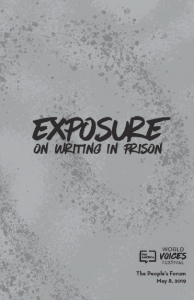Works of Justice is an online series that features content connected to the PEN America Prison and Justice Writing Program, reflecting on the relationship between writing and incarceration, and presenting challenging conversations about criminal justice in the United States.
What risks do incarcerated writers face when their words travel beyond prison walls? And how do audiences of their work read, honor, and bear witness without assuming voyeuristic or exploitative perspectives? The PEN America Prison Writing Program commissioned currently incarcerated writers to reflect on these and other tensions between the realm of public readership and the often hidden creative life in prison for the 2019 World Voices Festival.
Download our program booklet, which features excerpts of the written work and author bios, and scroll below to watch dynamic authors, poets, activists, and actors bring the writers’ messages to life on the stage. The following videos feature readers Mahogany L. Browne, Aja Monet, Jon Sands, Christopher Soto, Kirya Traber, and Jecoina Vinson.
Keep scrolling for process notes detailing how we brought this experience to life.
About Our Process
Every year PEN America produces the World Voices Festival, a week-long celebration of literature from around the world. For their 15th anniversary celebration, the World Voices Festival has taken on the urgent theme of Open Secrets, an exploration of the dissolving boundary between the public and the private in our literature, our politics, and our daily lives. Immediately we recognized the ways in which our work is in conversation with this theme. We began to ask questions—What risks do incarcerated writers face when their words travel beyond prison walls? And how do audiences of their work read, honor, and bear witness without assuming voyeuristic or exploitative perspectives? For over a decade, the Prison Writing Program has contributed a Festival event that highlights the work of writers in our program—typically, sourced from the award-winning work in our Prison Writing Contest archives. This year, we decided to try a new approach to our content curation: commissioning original works from some of the most active writers in our network to reflect on these and other tensions between the realm of public readership and the often hidden creative life in prison. Our process: We sent letters to a short list of names, with an invitation that offered a series of writing prompts:
- Why is it important to have an audience for your work—specifically speaking to an audience inside and/or outside of prison?
- Why is it important to have readers or witnesses to our personal narratives?
- What is the line between voyeurism and witnessing?
- What are your fears when people from the outside read your work? Any advice on what audiences should bring to the reading? What to put aside when reading?
- Writing in prison can often be exposing. How do you deal with the heightened risk of writing while incarcerated?
- How has being incarcerated affected your writing rituals or style? Does less privacy in living space have an impact on creative expression?
- People often consider the Internet and social media an increasing public sphere (though one that can largely be controlled.) With access to social media, what would you/could you do that you cannot now? Critiques? Ideas we might consider in our usage?

Lastly, we wrote, we are also open to other interpretations of this prompt, and invite creativity.
The array of writings captured on video, and excerpted in the program book, echo and affirm the shared experience of writers in prison—one of systemic barriers, censorship, and the personal risk, bravery, and relentless commitment it takes to reach a public readership. The writings also offer, of course, a wide spectrum of individual vulnerabilities, unique voice, and dedication to various forms of artistry and craft.
We were grateful to showcase the work in the capable hands of our author/activist performers on May 9, 2019, at the People’s Forum, and invited our audience to respond with thoughts, feelings, and revelations that arise via the index cards on your chair. The comments were sent back to our writers—one of the many ways we push against the wall that separates our worlds—offering a taste of what happened in the room back to the writers who couldn’t be with us.
Listen to the event:
Resources
Download the program here.
Featuring original work by: Brian Batchelor, Peter Dunne, Greg Goodman, Lacino Hamilton, Elizabeth Hawes, Matthew Feeney, Benjamin Frandsen, Arthur Longworth, Justin Rovillos Monson, Santonio Murff, and Joe Vanderford



